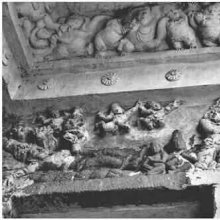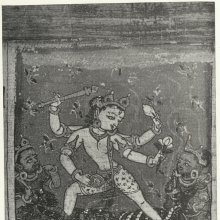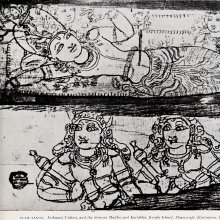Kaitabha, Kaiṭabha: 17 definitions
Introduction:
Kaitabha means something in Hinduism, Sanskrit, Jainism, Prakrit. If you want to know the exact meaning, history, etymology or English translation of this term then check out the descriptions on this page. Add your comment or reference to a book if you want to contribute to this summary article.
Images (photo gallery)
In Hinduism
Purana and Itihasa (epic history)
Source: archive.org: Puranic EncyclopediaKaiṭabha (कैटभ).—General information. Kaiṭabha was the brother of Madhu, an Asura (demon). These two brothers are known in the Purāṇas as Madhu-Kaiṭabhas. (See full article at Story of Kaiṭabha from the Puranic encyclopaedia by Vettam Mani)
Source: archive.org: Shiva Purana - English TranslationKaiṭabha (कैटभ) and Madhu are the names of two Asuras.—Madhu and Kaiṭabha sprang from the ear of Viṣṇu while he was asleep at the end of a Kalpa. As soon as born they tried to kill Brahmā who was lying on the lotus sprung from Viṣṇu’s navel. Viṣṇu killed them and obtained the names Kaitabhajit and Madhusūdana.
Source: Cologne Digital Sanskrit Dictionaries: The Purana Index1a) Kaiṭabha (कैटभ).—An Asura (Daitya, Vāyu-purāṇa) slain by Hari,1 born with Madhu, representing the qualities of tamas and rajas.2
- 1) Bhāgavata-purāṇa III. 24. 18; VI. 12. 1; X. 40. 17; Vāyu-purāṇa 25. 30, 54.
- 2) Matsya-purāṇa 170. 1; 178. 6-18.
1b) An Asura slain by Durgā.*
- * Brahmāṇḍa-purāṇa II. 37. 2; IV. 29. 75.
Kaiṭabha (कैटभ) is a name mentioned in the Mahābhārata (cf. II.9.15, V.128.49) and represents one of the many proper names used for people and places. Note: The Mahābhārata (mentioning Kaiṭabha) is a Sanskrit epic poem consisting of 100,000 ślokas (metrical verses) and is over 2000 years old.

The Purana (पुराण, purāṇas) refers to Sanskrit literature preserving ancient India’s vast cultural history, including historical legends, religious ceremonies, various arts and sciences. The eighteen mahapuranas total over 400,000 shlokas (metrical couplets) and date to at least several centuries BCE.
Pancaratra (worship of Nārāyaṇa)
Source: eScholarship: Chapters 1-14 of the Hayasirsa PancaratraKaiṭabha (कैटभ) and Madhu were slain by Lord Hayaśīrṣa, as mentioned in the 9th century Hayaśīrṣa-pañcarātra (Ādikāṇḍa chapter 1).—“[...] Maheśvara said: Mighty Lord Hayaśīrṣa—who was the slayer of Madhu and Kaiṭabha—when he was in the cosmic ocean–was asked by you Bhṛgu about the Pañcarātra. O Intelligent one, please tell me of the four Vedas, which were consigned, all of that at great length, O four-faced one”.
Note: The story of Madhu and Kaiṭabha appears in many Pañcarātra texts, including the Jayākya-saṃhitā, it is also in the Mahābhārataas well as in the Uttarakāṇḍa of the Vālmiki Rāmāyaṇa. The development of the story has been traced by Andreas Bock. Bock traces the development of the story from what he sees as its first appearance in the Mahābhārata till its later development in various Pāñcarātra sources. With regards to the version [of Kaiṭabha and Madhu] told in the Hayaśīrṣa Pañcarātra Bock sees it as directly dependent on the Viṣṇudharmottara-purāṇa1.15, The Mahābhārata 12. 335, Jayākhya-saṃhitā s and Ahirbudhnya-saṃhitā 41.

Pancaratra (पाञ्चरात्र, pāñcarātra) represents a tradition of Hinduism where Narayana is revered and worshipped. Closeley related to Vaishnavism, the Pancaratra literature includes various Agamas and tantras incorporating many Vaishnava philosophies.
Vaishnavism (Vaishava dharma)
Source: Pure Bhakti: Brhad BhagavatamrtamKaiṭabha (कैटभ) refers to:—A demon killed by Śrī Viṣṇu. (cf. Glossary page from Śrī Bṛhad-bhāgavatāmṛta).

Vaishnava (वैष्णव, vaiṣṇava) or vaishnavism (vaiṣṇavism) represents a tradition of Hinduism worshipping Vishnu as the supreme Lord. Similar to the Shaktism and Shaivism traditions, Vaishnavism also developed as an individual movement, famous for its exposition of the dashavatara (‘ten avatars of Vishnu’).
In Jainism
General definition (in Jainism)
Source: archive.org: TrisastisalakapurusacaritraKaiṭabha (कैटभ) is the brother of Madhu, according to chapter 4.4 [anantanātha-caritra] of Hemacandra’s 11th century Triṣaṣṭiśalākāpuruṣacaritra: an ancient Sanskrit epic poem narrating the history and legends of sixty-three illustrious persons in Jainism.
Accordingly:—“In course of time Caṇḍaśāsana died and wandered in many birth-nuclei present in the whirlpool of the ocean of existence. He became the son, named Madhu, of King Vilāsa by his wife Guṇavatī in the city Pṛthvī in this Bharata. With a life-period of thirty lacs of years, the color of a tāpiccha-blossom, fifty bows tall, he looked like a living mountain. [...] He had a full brother also, Kaiṭabha, a winnowing-fan among the enemies' soldiers pounded by the immense mallet of his arm, handsome from the enjoyment of his enemies’ Śrī”.

Jainism is an Indian religion of Dharma whose doctrine revolves around harmlessness (ahimsa) towards every living being. The two major branches (Digambara and Svetambara) of Jainism stimulate self-control (or, shramana, ‘self-reliance’) and spiritual development through a path of peace for the soul to progess to the ultimate goal.
Languages of India and abroad
Sanskrit dictionary
Source: DDSA: The practical Sanskrit-English dictionaryKaiṭabha (कैटभ).—Name of a demon killed by Viṣṇu. [He was a very powerful demon. He and Madhu are said to have sprung from the ears of Viṣṇu while he was asleep; and when they were about to devour Brahman they were slain by Viṣṇu].
-bhā, -bhī An epithet of Durgā.
Derivable forms: kaiṭabhaḥ (कैटभः).
Source: Cologne Digital Sanskrit Dictionaries: Edgerton Buddhist Hybrid Sanskrit DictionaryKaiṭabha (कैटभ).—(once in Lalitavistara) kaiṭubha, m. (= Pali keṭu-bha), ritual science (of the Veda; = Sanskrit kalpa, as a Vedāṅga; so Buddhaghosa on the Pali, see [Pali Text Society’s Pali-English Dictionary]): for the corrupt text of Lalitavistara 156.18 (in list of sciences) ajalak- ṣaṇe miśṛlakṣaṇe kauṭubheśvaralakṣaṇe nirghaṇṭe, read, with each word confirmed by Tibetan and supported by good mss. (except mss. śvara for śva), but order correct only in Tibetan, all Sanskrit mss. kaiṭ° before śva°: ajalakṣaṇe miṇ- ḍhalakṣaṇe śvalakṣaṇe kaiṭubhe nirghaṇṭe; Mahāvyutpatti 5052 kaiṭabhaḥ, following 5051 nighaṇṭuḥ; otherwise only in [bahuvrīhi] [compound] sa-nighaṇṭa- (or nirghaṇṭa-)-kaiṭabha, epithet of veda, along with etymology and ritual science: (vedā- nāṃ…) sa° °bhānāṃ Mahāvastu i.231.18; ii.77.9; 89.17; iii.450.7; Avadāna-śataka ii.19.7; (vedān…) sa° °bhān Divyāvadāna 619.22.
Source: Cologne Digital Sanskrit Dictionaries: Shabda-Sagara Sanskrit-English DictionaryKaiṭabha (कैटभ).—m.
(-bhaḥ) A demon slain by Vishnu'. f.
(-bhā) A name of Durga. E. kaiṭabha a demon in whose death the goddess was instrumental, by having at the prayers of Brahma roused Vishnu from his slumbers, during which two demons, Kaitabha and Madhu, were about to demolish Brahma; also kaiṭabhī.
Source: Cologne Digital Sanskrit Dictionaries: Benfey Sanskrit-English DictionaryKaiṭabha (कैटभ).—m. The name of an Asura or demon, Mahābhārata 3, 498.
Source: Cologne Digital Sanskrit Dictionaries: Cappeller Sanskrit-English DictionaryKaiṭabha (कैटभ).—[masculine] [Name] of an Asura slain by Viṣṇu.
Source: Cologne Digital Sanskrit Dictionaries: Monier-Williams Sanskrit-English Dictionary1) Kaiṭabha (कैटभ):—m. Name of an Asura (slain by Viṣṇu), [Mahābhārata iii; Harivaṃśa; Suśruta; Bhāgavata-purāṇa; Brahma-purāṇa] etc.
2) f(ā or ī) Name of Durgā, [cf. Lexicographers, esp. such as amarasiṃha, halāyudha, hemacandra, etc.]
3) n. Name of a class of writings, [Divyāvadāna xxxiii] (Pāli keṭubha), [Varāha-mihira’s Yogayātrā]
Source: Cologne Digital Sanskrit Dictionaries: Yates Sanskrit-English Dictionary1) Kaiṭabha (कैटभ):—(bhaḥ) 1. m. A demon slain by Vishnu. f. (yā) Durgā.
2) (bhā) 1. f. A name of Durgā.
Source: DDSA: Paia-sadda-mahannavo; a comprehensive Prakrit Hindi dictionary (S)Kaiṭabha (कैटभ) in the Sanskrit language is related to the Prakrit words: Keḍha, Keḍhava.
[Sanskrit to German]
Sanskrit, also spelled संस्कृतम् (saṃskṛtam), is an ancient language of India commonly seen as the grandmother of the Indo-European language family (even English!). Closely allied with Prakrit and Pali, Sanskrit is more exhaustive in both grammar and terms and has the most extensive collection of literature in the world, greatly surpassing its sister-languages Greek and Latin.
See also (Relevant definitions)
Starts with: Kaitabhabhid, Kaitabhadvish, Kaitabhahan, Kaitabhajit, Kaitabhardana, Kaitabhari, Kaitabharipu.
Ends with: Madhukaitabha.
Full-text (+29): Kaitabhajit, Madhu, Medini, Kaitabhari, Kaitabhahan, Kaitabhardana, Daityamedaja, Kaitabhadvish, Kaitabhabhid, Madhukaitabha, Kaitabheshvaralakshana, Hayagriva, Kautubha, Kaitabheshvari, Prashnika, Jit, Kedhava, Kedha, Ujjapalaka, Madhukaitasasudana.
Relevant text
Search found 41 books and stories containing Kaitabha, Kaiṭabha; (plurals include: Kaitabhas, Kaiṭabhas). You can also click to the full overview containing English textual excerpts. Below are direct links for the most relevant articles:
Puranic encyclopaedia (by Vettam Mani)
Tiruvaymoli (Thiruvaimozhi): English translation (by S. Satyamurthi Ayyangar)
Pasuram 7.8.1 < [Section 8 - Eighth Tiruvaymoli (Maya! Vamanane!)]
The Devi Bhagavata Purana (by Swami Vijñanananda)
Chapter 6 - On the preparation for war by Madhu Kaiṭabha < [Book 1]
Chapter 9 - On the killing of Madhu Kaiṭabha < [Book 1]
Chapter 11 - On the killing of Madhu Kaiṭabha < [Book 10]
Harivamsha Purana (by Manmatha Nath Dutt)
Chapter 13 - The World of Creation Begins: the Birth of Madhu and Kaitabha < [Book 3 - Bhavishya Parva]
Chapter 47 - The Danavas Described < [Book 3 - Bhavishya Parva]
Chapter 129 - The Battle between Vana and Krishna < [Book 2 - Vishnu Parva]
The Markandeya Purana (by Frederick Eden Pargiter)
Canto LXXXI - Commencement of the Devī-Māhātmya
Canto XCII - The Devī-Māhātmya: The slaying of Śumbha and Niśumbha concluded
Canto LXXXIV - The Devī-Māhātmya: The Slaying of the Asura Mahiṣa concluded
The Padma Purana (by N.A. Deshpande)
Chapter 2 - Characteristic Marks of a Vaiṣṇava < [Section 7 - Kriyāyogasāra-Khaṇḍa (Section on Essence of Yoga by Works)]
Chapter 40 - The army of Demons (Asuras) < [Section 1 - Sṛṣṭi-khaṇḍa (section on creation)]
Related products



